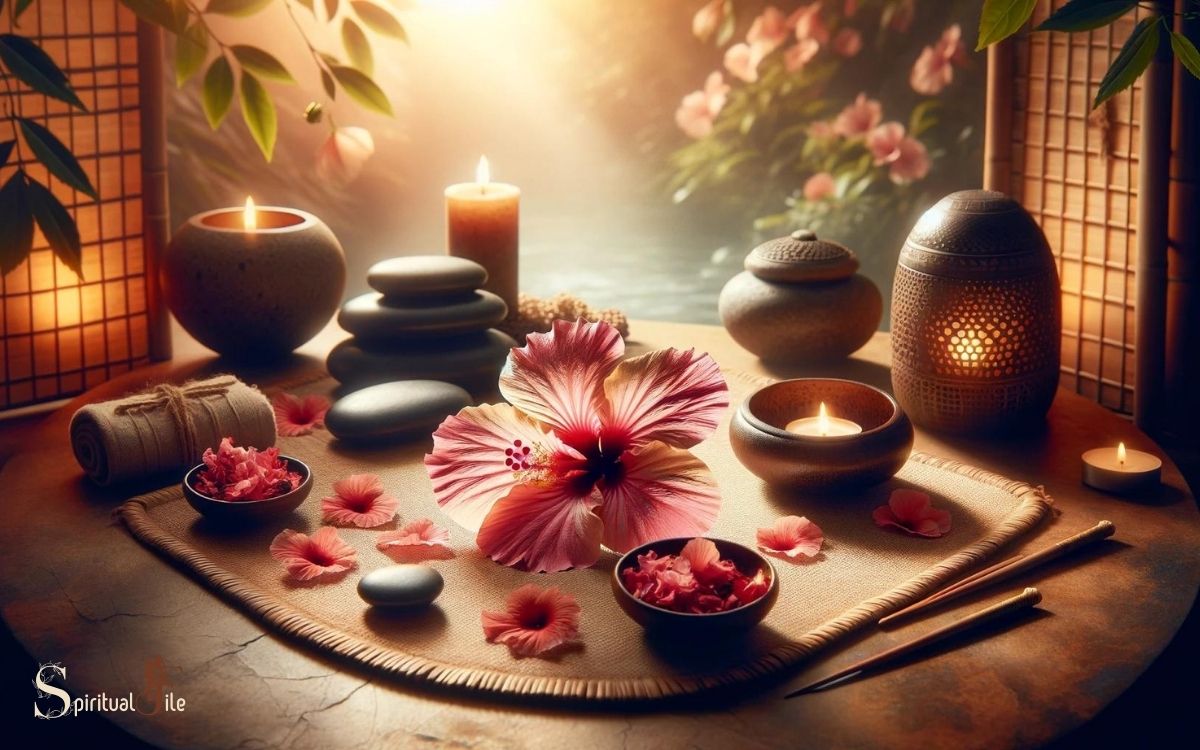What Is Hibiscus Used for Spiritually? Healing!
Hibiscus is often used spiritually for its associations with love, divination, and healing. In various cultures, it is believed to attract positive energies and can be used in rituals and ceremonies to enhance intuition, promote emotional balance, and support personal growth.
The hibiscus flower carries significant spiritual symbolism and is utilized in different cultural rituals for its supposed metaphysical properties.
Here’s a breakdown of some of the spiritual uses of hibiscus:
A short example of hibiscus use in spiritual practices could be placing hibiscus petals in a bath to cleanse oneself of negative emotions or drinking hibiscus tea before meditation to enhance focus and intuition.
Embracing the vibrant energies of hibiscus can aid in spiritual awakening and emotional clarity, making it a cherished component in holistic and metaphysical practices.

Key Takeaway
Historical and Cultural Significance
The historical and cultural significance of hibiscus spans across centuries and continents, influencing spiritual practices and traditions.
- In many cultures, hibiscus is seen as a symbol of beauty, youthfulness, and femininity. It has been used in various spiritual rituals, symbolizing delicate beauty, purity, and even representing the fleeting nature of life.
- For instance, in Hindu culture, the goddess Kali is offered hibiscus flowers as a gesture of devotion and respect.
- In ancient Egypt, hibiscus tea was consumed for its supposed medicinal and spiritual properties.
The vibrant red color of the hibiscus flower is often associated with the energy of the root chakra in spiritual practices.
Its presence in religious ceremonies and folklore across different civilizations highlights its enduring spiritual significance.
Symbolism and Spiritual Meaning
Symbolism and spiritual meaning associated with hibiscus reflect its enduring significance in various cultural and religious practices. For many, the hibiscus represents beauty, unity, and the delicate balance between life and death.
In my research, I discovered that hibiscus is often used to symbolize the following:
- Femininity: In many cultures, the hibiscus flower symbolizes the essence of femininity, representing beauty, charm, and the delicate nature of women.
- Transformation: The hibiscus is seen as a symbol of transformation and change, signifying the delicate balance between the various stages of life.
- Love and Passion: The vibrant red color of the hibiscus is often associated with love, passion, and romance in many spiritual and cultural contexts.
- Hospitality and Offerings: In some traditions, hibiscus flowers are used to represent hospitality and are often offered as a symbol of welcome and respect to guests.
Rituals and Ceremonies
In my exploration of hibiscus’s spiritual significance, I found that in various rituals and ceremonies, the hibiscus continues to symbolize femininity, transformation, love, and hospitality.
It is often used in rituals related to love and marriage, where it represents the delicate and beautiful aspects of femininity.
Additionally, in ceremonies focused on transformation and growth, the hibiscus is used to symbolize the potential for personal development and change.
Its association with hospitality is evident in rituals welcoming guests or fostering positive social interactions.
Below is a table summarizing the use of hibiscus in various spiritual rituals and ceremonies:
| Rituals and Ceremonies | Symbolism |
|---|---|
| Love and Marriage | Femininity |
| Transformation | Growth |
| Hospitality | Welcoming |
Healing and Cleansing Practices
Exploring the spiritual uses of hibiscus, I find healing and cleansing practices to be significant in my personal experiences.
The vibrant hibiscus flower holds spiritual significance in various cultures, often used for healing and purification rituals. In my own spiritual practice, I have found hibiscus to be a valuable tool for promoting physical, emotional, and spiritual well-being.
Here are some ways in which hibiscus is used for healing and cleansing practices:
- Physical Healing: Hibiscus is believed to have medicinal properties that aid in alleviating various ailments.
- Emotional Cleansing: The aroma and vibrant color of hibiscus are thought to cleanse and uplift the emotions, promoting a sense of peace and harmony.
- Spiritual Purification: Hibiscus is used in rituals to purify and cleanse the energy of a person or space.
- Renewal and Rejuvenation: The use of hibiscus is associated with renewal and rejuvenation, both physically and spiritually.
Connection to Divine Energies
Throughout my spiritual journey, I have experienced a profound and transformative connection to divine energies through the use of hibiscus.
The vibrant and delicate hibiscus flower has a remarkable ability to enhance my spiritual practices and facilitate a deeper connection to the divine.
When I incorporate hibiscus into my meditation or prayer rituals, I feel a heightened sense of spiritual awareness and an increased receptivity to divine energies.
The flower’s association with love, beauty, and purity aligns with my intention to connect with higher spiritual realms and foster a sense of inner peace.
It serves as a gentle yet potent conduit for me to attune myself to the universal energies and experience a profound sense of harmony and oneness with the divine.
Conclusion
After experiencing the calming and grounding effects of hibiscus during a meditation session, I realized its spiritual significance. Just like the hibiscus, we can bloom and thrive in any environment, embracing our inner beauty and strength.
This flower has been used for centuries to connect with divine energies and cleanse the spirit. Its symbolism and healing properties make it a powerful tool for spiritual growth and transformation.






